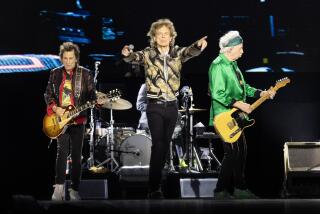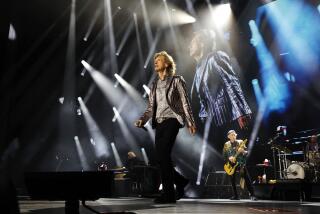Stones Roll Into Moscow
- Share via
MOSCOW — Although the sensation may be elusive for a country torn by a century of turmoil and for rock superstars with 35 years of glory already behind them, both Russia and the Rolling Stones finally got some satisfaction.
The aging sultans of sass started up several generations of Russians in their first-ever concert here Tuesday, conquering the cultural prudes who for decades deemed their music too decadent for the ears of a cloistered proletariat.
“Hello, Russia! Finally, we’re here!” Mick Jagger crowed in heavily accented Russian in a greeting that nevertheless won wild cheers from the diverse crowd of 80,000, 31 years after the band first applied for permission to perform in what was then the Soviet Union.
Despite bursts of heavy rain in the open-air Luzhniki Stadium and 3,500 police officers to remind beer-soaked spectators that order was only a shot away, the Stones’ long-delayed debut was infused with a sunny sense of bourgeois well-being.
Fiftysomethings brought their adult children and their grandchildren to a rare event celebrating an institution that has transcended generations, transforming the debut concert of the craggy-faced core of rollingi into a unifying force in a society sharply divided by age.
Still, the bulk of the crowd reflected the band’s popularity with baby boomers, with many more raincoats and ties visible in the audience than torn T-shirts.
“For me, this is like Mecca. Every one of the faithful should get to see the Rolling Stones live at least once in a lifetime,” effused Mikhail Podorozhansky, a 39-year-old automotive magazine editor still in his button-down office clothes. Like many Russians of his generation who were clandestinely drawn into the rock scene because they listened to “the voices”--Western radio broadcasts beamed to Soviets--Podorozhansky says he has been a fan of the Stones since first hearing their music in the late 1960s.
Igor Spodar, a 40-year-old businessman, brought his three teenage daughters to hear the music of his deprived generation, using the concert as a lesson in the illogical economics of the old order.
“If I could have bought one Rolling Stones album in the 1970s for what I paid for these tickets in today’s prices, I would have been a blissfully happy man,” Spodar said of an era when money meant nothing and access to desirable goods was a currency in itself.
Economics, however, appeared to have played a huge role in finally wooing the Stones to Moscow. Hardly a spectator sat without a cassette or CD or “Bridges to Babylon” T-shirt on his or her lap.
Tickets sold for as much as $350 at official prices--and for more than twice that on the black market or with “special access” promises made by the promoters.
Fans chartered planes and organized buses from throughout the country, from the 160 Novosibirsk residents who flew nearly five hours to Moscow on the day of the concert only to board a plane back home early Wednesday, to the 50 fans from the Belarussian capital, Minsk, who came by bus.
While the panting and pyrotechnics of the performance appeared to satisfy on all age levels, Russian media had been making the unsolicited observations that the Stones were old enough to be the fathers or grandfathers of today’s movers and shakers.
“The musicians look like the animated mummies of Tutankhamen,” the weekly Profil magazine observed, noting that the sound of bone-creaking probably drowned out any creative spirit.
In a country where the average man lives to only 58, the Rolling Stones and their highly animated onstage antics are hard for the middle-aged majority to contemplate or for the newly enriched youth to comprehend.
More to Read
The biggest entertainment stories
Get our big stories about Hollywood, film, television, music, arts, culture and more right in your inbox as soon as they publish.
You may occasionally receive promotional content from the Los Angeles Times.











